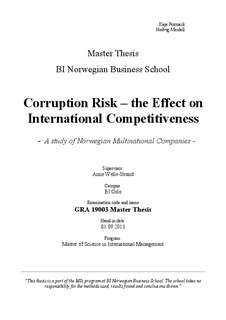Corruption risk - the effect on international competitiveness : a study of Norwegian multinational companies
Master thesis
Permanent lenke
http://hdl.handle.net/11250/95117Utgivelsesdato
2014-02-11Metadata
Vis full innførselSamlinger
- Master of Science [1621]
Sammendrag
Corruption is a debated topic among actors in the international business
environment, particularly as stringent anti-corruption legislations pose restrictions
on how companies can legally operate. Corruption is by many leading economists
regarded as a worldwide challenge and an impediment to economic growth and
development. Norway has taken an active role in the international fight against
corruption, and this thesis asks whether this could affect Norwegian multinational
companies’ (MNCs) competitiveness.
This thesis examines how the risk of corruption affects Norwegian multinational
companies’ international competitiveness. To limit the scope, the thesis asks the
following sub-questions: (1) how is the inherent risk of corruption considered?
(2) How is the inherent risk of corruption managed? A qualitative study has been
conducted on five Norwegian multinational companies, operating in the BRIC
countries (Brazil, Russia, India, China). The MNCs operate in different industries
and represent a combination of private/public and privately owned companies.
The research found that the MNCs consider the inherent risk of corruption to be
high. The MNCs respond to the identified risk by implementing strict internal
procedures for corruption risk management. However, despite these procedures,
certain MNCs recognize that they are unable to reduce the risk to an acceptable
level, leading to risk aversion.
The implementation of anti-corruption procedures, as a result of identified risk, is
found to affect the MNCs’ international competitiveness negatively in two ways.
On one hand, it requires a considerable amount of resources that might affect the
companies’ profitability. On the other hand, risk aversion may force the MNCs to
exclude certain markets due to the identified corruption risk. These consequences
are, however, argued to be short term.
On a long-term basis, the anti-corruption procedures are assumed to contribute to
international competitiveness. If anti-corruption laws continue to proceed towards
a global standard, it is argued to cause equal competitive conditions for all
multinational actors.
Beskrivelse
Masteroppgave (MSc) in Master of Science in International Management, Handelshøyskolen BI, 2014
